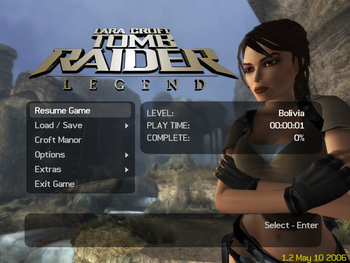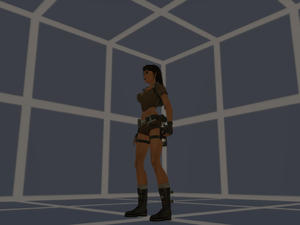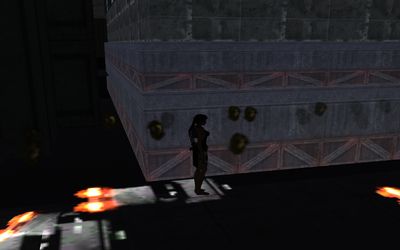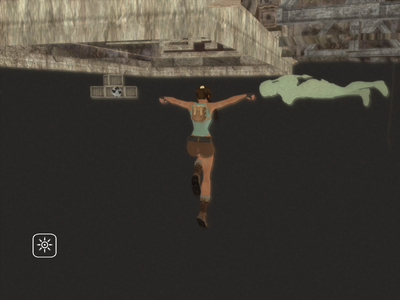User:WhoIAm/Tomb Raider: Legend
| WhoIAm |
|---|
|
Developer: Crystal Dynamics
|
Tomb Raider: Legend is the 7th game in the long-running Tomb Raider series, and the first game to reboot the franchise. The plot involves Lara scouring the globe for artifacts that complete the ancient sword Excalibur.
Note: Free-movement mode: Press Tab+W, to exit, Press Tab+S
Contents
Rocket Launcher
There is an unused but quite complete rocket launcher weapon, last seen in Tomb Raider 3. Its behavior is a bit glitchy; sometimes fired rockets will get stuck in midair and simply disappear after a while. It can be activated using the debug .exe launcher for the game and choosing the All Weapons option. The weapon lacks an HUD icon, unlike all of the others. Like the hand-thrown grenades, rockets will damage Lara if she is within blast range.
Test Room
"comp_entry" and "comp_exit" are very simple, cubic, uneventful test rooms with nothing in them. "lara_depot" is the same room but without any light, presumably used to test the PLS.
There are a few other units that will crash the game when attempting to load them.
Oddities
Internal numbering schemes
The game's internal numbering schemes for its "chapters" (levels) and "units" (areas within levels) are very messy. For example, chapters are listed as xxxx.
Placeholder Mission Briefing
Chapter 7 crashes the game after displaying a placeholder mission briefing.
Ghana: Title Screen variation
The level "Amahlin_97" is an incomplete version of the opening waterfall area in Ghana, used in the final game only as a backdrop for the title screen. However, the level contains many points of interest. The lighting is darker and flatter green than in the final game. The water texture is simpler than in the final and a lot of collision doesn't match up with the level's visible geometry (but is functional enough to be considered intentional; all of the ground is solid, ledges and poles work, and major structures are all present).
Most interestingly, some of the ledges and poles are too high or far for Lara to reach with jumps, suggesting that in earlier development, Lara simply jumped higher and further. The comparison below shows one such ledge that was slightly lowered for the final game. In Amahlin_97, Lara cannot reach the upper ledge with a regular jump like she can in the final; in addition, the rock wall behind the ledge was retextured.
| Amahlin_97 | Final |
|---|---|
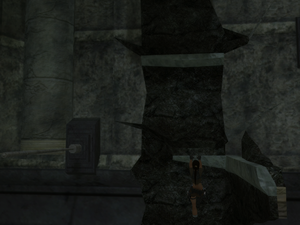 |
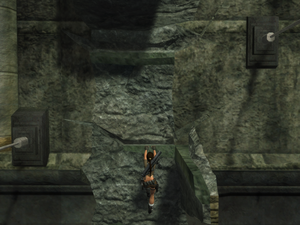 |
In addition, part of the temple's top-left corridor was modeled (unusual for Amahlin_97, as no other corridors are modeled). It reveals a different design; instead of large-headed statue idols, menacing spider carvings and cobwebs adorn the walls. In the final game, the spider carvings are used in the first few areas of the temple, but change to the statue carvings as Lara progresses. Furthermore, Amahlin_97's corridor abruptly ends with a regular doorway; there is no doorway here in the final version.
[pictures or videos]
Animated particles in the streets of Tokyo
Normally, Lara doesn't visit the streets of Tokyo (unless she falls off a roof and dies). However, not only are the streets modeled, there are also strange dust-like objects with only 2 frames of animation. They drift aimlessly around the streets, flickering in and out of existence, but also seem to congregate near intersections.
None of this unusual behavior can be seen under normal circumstances.
This can't be seen in the PSP version because the streets are not modeled.
Hidden Angel of Darkness-style Lara Croft models
Two untextured models that resemble Lara Croft from the previous game, The Angel of Darkness, are present below the ground during the flashback section in Peru. Resemblances include eyeglasses and ponytails. They cannot be seen normally.
